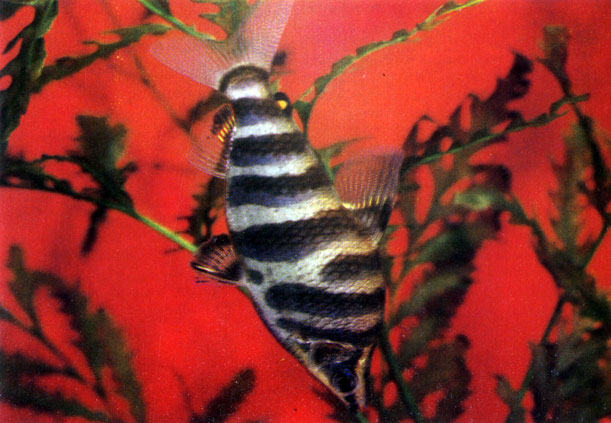
1. Обыкновенный аностом - Anostomus anostomus. Абрамит - Abramites hypselonotus. Сем. Аностомовые - Anostomidae
Населяют бассейны рек Амазонки и Ориноко. Род Аностомы насчитывает более 10 видов. Абрамиты - всего 3 вида. Самцы стройнее. Размер в аквариуме обычно не превышает 13 - 15 см. Окраска у обыкновенного аностома желтоватая (до красной) с тремя темными продольными полосами. Абрамиты украшены неровными поперечными полосами коричневатого цвета. Корм: животный 60%, растительный 40%. Созревают к 1,5 - 2 годам. Нерест парный. Разведение сложно, гормональная стимуляция нереста путем инъекций гонадотропных гормонов дает наиболее стабильные результаты. Плодовитость до 200 икринок, инкубационный период около суток при Т 26 - 28°С. Стартовый корм: мельчайший планктон. По манере плавать вниз головой к этим видам близок представитель семейства Куриматовых (Curimatidae) хилод - Chilodus punctatus (на верхнем фото справа). Разведение хилодов освоено без гормональных инъекций.

Обыкновенный аностом - Anostomus anostomus. Сем. Аностомовые - Anostomidae

Абрамит - Abramites hypselonotus. Сем. Аностомовые - Anostomidae
Common headstander (Anostomus anostomus). Headstander (Abramites hypselonotus). Family Headstanders (Anostomidae)
Inhabit the Amazon and Orinoco basins. The genus Anostomus is composed of more than 10 species, the genus Abramites of 3 only. Males more slender. Grow usually to 13 - 15 cm in captivity. Colouring of Common Headstander is yellowish (to red) with three dark longitudinal bars. Abramites are decorated with crooked brown transverse bars. Food: 60% animal and 40% vegetable. Sexually mature at 1.5 - 2 years. Spawning in pairs. Breeding is complicated; most effective results may be obtained using hormonal stimulation with injections of gonadotropic hormones. Fecundity up to 200 eggs, incubation period about 24 hours at 26 to 28° C. Feeding commences with smallest plankton. The representative of other family - Curimatas (Curimatidae) - Spotted Headstander (Chilodus punctatus) (upper photo, right) with its head-down position is very close to above-mentioned species. The breeding of Spotted Headstanders is well accomplished without hormonal injections.
|
ПОИСК:
|
© Злыгостев Алексей Сергеевич, 2001-2019
При использовании материалов сайта активная ссылка обязательна:
http://aquariumlib.ru/ 'Библиотека по аквариумистике'
При использовании материалов сайта активная ссылка обязательна:
http://aquariumlib.ru/ 'Библиотека по аквариумистике'